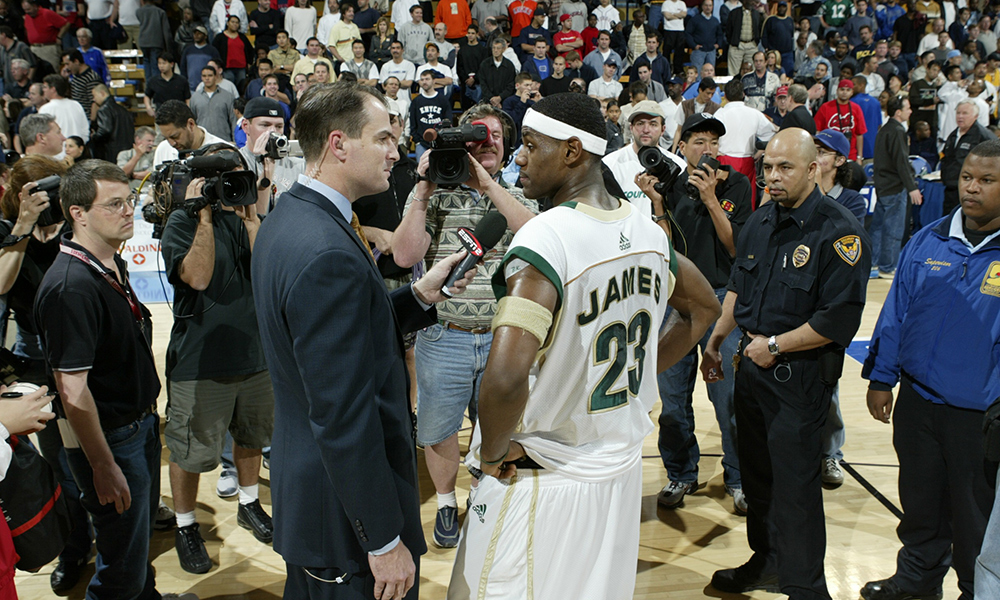
韦德布什(Wedbush)分析师丹·艾夫斯(Dan Ives)以对科技股的生动评论而闻名,人工智能芯片巨头英伟达(Nvidia)经常成为他生动评论的对象。
上周四,他继续看好英伟达,将其比作史上最伟大的篮球运动员之一。
艾夫斯在接受彭博电视台采访时表示:“如果你看看英伟达,就这个故事的最终走向而言,这就像是高中时期的勒布朗。”
在随后的采访中,他又回到了这个类比,并表示英伟达之所以像年轻的勒布朗·詹姆斯,是因为它远远领先于其他竞争对手,是“独一无二的选择”。
在发表这番评论时,尽管英伟达上周三晚些时候发布的财报超出了预期,但投资者仍在推低其股价。
不过,尽管华尔街的担忧主要集中在即将推出的Blackwell芯片的延期上,艾夫斯表示,首席执行官黄仁勋(Jensen Huang)的营收预期仍然强劲,尽管低于分析师最乐观的预期,但还是平息了这些担忧。
他在谈到英伟达的财报时补充道:“财报来了。他们兑现了承诺。我认为,对科技股来说,这将为反弹提供动力。”
根据他在亚洲的渠道调查,艾夫斯估计Blackwell芯片的营收可能达到数百亿美元,并将该公司的模糊预期归因于黄仁勋不愿透露战略。
他还吹捧了英伟达在更广泛的科技领域的乘数效应,称在其芯片上花费的每一美元都会在整个行业产生8-10倍的连锁反应。
艾夫斯认为,未来三年人工智能领域的资本支出将达到1万亿美元,是他六个月前预测的两倍。
他补充说,对英伟达芯片的需求也在加速扩大,除了微软(Microsoft)、OpenAI、亚马逊(Amazon)和谷歌(Google)等所谓的超大规模客户之外,随着更多人工智能用例的出现,其他企业也在加紧努力。
“罗马非一日建成,人工智能革命亦是如此,如今人工智能已经开始形成合力。”
艾夫斯并不是唯一一个无视股市对英伟达财报最初反应的华尔街分析师。大多数分析师仍将该公司股票归为“买入”类别。
美国银行(Bank of America)全球研究部重申了买入评级,并将其股票目标价从150美元上调至165美元,称英伟达仍是“生成式人工智能周期的主要受益者”,并恳请投资者“忽略季度噪音”。
英伟达股价上周五收于119.37美元,周跌幅约为8%。
凯投宏观(Capital Economics)亚太区市场主管托马斯·马修斯(Thomas Matthews)在一份报告中表示:“我们认为,尽管投资者对英伟达利润的快速增长明显感到失望,但人工智能的涨势仍将持续下去。”(财富中文网)
译者:中慧言-王芳
韦德布什(Wedbush)分析师丹·艾夫斯(Dan Ives)以对科技股的生动评论而闻名,人工智能芯片巨头英伟达(Nvidia)经常成为他生动评论的对象。
上周四,他继续看好英伟达,将其比作史上最伟大的篮球运动员之一。
艾夫斯在接受彭博电视台采访时表示:“如果你看看英伟达,就这个故事的最终走向而言,这就像是高中时期的勒布朗。”
在随后的采访中,他又回到了这个类比,并表示英伟达之所以像年轻的勒布朗·詹姆斯,是因为它远远领先于其他竞争对手,是“独一无二的选择”。
在发表这番评论时,尽管英伟达上周三晚些时候发布的财报超出了预期,但投资者仍在推低其股价。
不过,尽管华尔街的担忧主要集中在即将推出的Blackwell芯片的延期上,艾夫斯表示,首席执行官黄仁勋(Jensen Huang)的营收预期仍然强劲,尽管低于分析师最乐观的预期,但还是平息了这些担忧。
他在谈到英伟达的财报时补充道:“财报来了。他们兑现了承诺。我认为,对科技股来说,这将为反弹提供动力。”
根据他在亚洲的渠道调查,艾夫斯估计Blackwell芯片的营收可能达到数百亿美元,并将该公司的模糊预期归因于黄仁勋不愿透露战略。
他还吹捧了英伟达在更广泛的科技领域的乘数效应,称在其芯片上花费的每一美元都会在整个行业产生8-10倍的连锁反应。
艾夫斯认为,未来三年人工智能领域的资本支出将达到1万亿美元,是他六个月前预测的两倍。
他补充说,对英伟达芯片的需求也在加速扩大,除了微软(Microsoft)、OpenAI、亚马逊(Amazon)和谷歌(Google)等所谓的超大规模客户之外,随着更多人工智能用例的出现,其他企业也在加紧努力。
“罗马非一日建成,人工智能革命亦是如此,如今人工智能已经开始形成合力。”
艾夫斯并不是唯一一个无视股市对英伟达财报最初反应的华尔街分析师。大多数分析师仍将该公司股票归为“买入”类别。
美国银行(Bank of America)全球研究部重申了买入评级,并将其股票目标价从150美元上调至165美元,称英伟达仍是“生成式人工智能周期的主要受益者”,并恳请投资者“忽略季度噪音”。
英伟达股价上周五收于119.37美元,周跌幅约为8%。
凯投宏观(Capital Economics)亚太区市场主管托马斯·马修斯(Thomas Matthews)在一份报告中表示:“我们认为,尽管投资者对英伟达利润的快速增长明显感到失望,但人工智能的涨势仍将持续下去。”(财富中文网)
译者:中慧言-王芳
Wedbush analyst Dan Ives has a reputation for colorful quotes on tech stocks, and AI chip giant Nvidia has often been the target of his rhetorical arsenal.
On Thursday, he continued to make the bull case for Nvidia, comparing it to one of the greatest basketball players of all time.
“If you look at Nvidia here, this is LeBron in high school in terms of where this story is ultimately going,” Ives told Bloomberg TV.
Later in the interview, he circled back to the comparison and said the reason why Nvidia resembles a young LeBron James is because it’s so far ahead of any other competitor and is “the only game in town.”
The remarks came as investors were sending Nvidia stock lower despite an earnings report that blew away forecasts late Wednesday.
But while Wall Street’s concerns were focused on delays to the forthcoming Blackwell chips, Ives said CEO Jensen Huang put to rest those worries with revenue guidance that was still robust, even if it fell short of the most aggressive analyst views.
“They came. They delivered,” he added about Nvidia earnings. “And I think for tech, this is going to put fuel in that rally.”
Based on his channel checks in Asia, Ives estimated that Blackwell revenue could reach tens of billions dollars, attributing the company’s vaguer guidance to Huang being reluctant to reveal his playbook.
He also touted a multiplier effect Nvidia has across the broader tech landscape, saying every dollar spent on its chips ripples through the sector by a factor of 8-10 times.
That’s as Ives sees $1 trillion of capital expenditures on AI over the next three years—double his forecast from just six months ago.
Demand for Nvidia chips is also accelerating and widening beyond the so-called hyperscaler customers like Microsoft, OpenAI, Amazon, and Google, with other enterprises stepping up as more AI use cases emerge, he added.
“Rome wasn’t built in a day, neither will the AI revolution,” he predicted. “It’s starting to come together.”
Ives wasn’t the only Wall Street analyst looking past the initial stock market reaction to Nvidia’s earnings report. Most still put shares in the “buy” category.
Bank of America Global Research reiterated a buy rating and raised its price target on shares from $150 to $165, saying Nvidia remains the “key genAI cycle beneficiary” and imploring investors to “ignore quarterly noise.”
Nvidia stock closed Friday at $119.37, representing a weekly loss of about 8%.
“We think the AI rally has further to run, despite investors’ apparent disappointment with Nvidia’s rapid profit growth,” Thomas Matthews, Capital Economics’ head of markets, Asia Pacific, said in a note.






